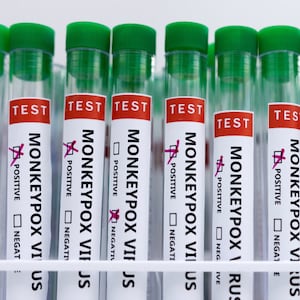As the number of monkeypox cases rises around the world, the Biden administration is ramping up its ability to dispatch thousands—or potentially millions—of vaccine doses to fight what has quickly become the largest outbreak of the virus in history. But troubling early indicators of groups that may be at high risk for contracting could mean that the guidelines dictating who is eligible for those vaccines may need to shift.
On Monday, the Department of Health and Human Services instructed the manufacturer of the latest vaccine for the virus to deliver 36,000 doses from an American stockpile in Europe. Once delivered, the Centers for Disease Control and Prevention will be able to distribute them to a dozen states where cases of the rare illness have been confirmed since mid-May.
The swift request of tens of thousands of vaccine doses comes as the number of known domestic cases reached 31 on Monday, according to the CDC, part of a pair of outbreaks that have seen more than a thousand cases across nearly three dozen countries. The request, as well as the swift creation of guidelines for who will receive doses of the vaccines, public health experts said, showcases that some of the lessons learned from early missteps in the COVID-19 pandemic response have been put into practice.
ADVERTISEMENT
But with several superspreader events related to LGBT venues and events in Europe, some public health experts are hoping for a more aggressive posture on who will be able to receive a vaccine—even though no public health experts are calling for a COVID-esque mass vaccination strategy.
“I applaud the Biden administration in securing additional doses of the vaccine, but it needs a more coherent strategy for identification of cases and close contacts, and for determining which individuals or populations should be offered the vaccine,” said Lawrence Gostin, director of the O’Neill Institute for National and Global Health Law at Georgetown Law Center. “I worry greatly that we will see an escalation of cases, especially in high risk groups such as men who have sex with men. I also worry that we are repeating the errors of the AIDS epidemic by stigmatizing these communities and driving them underground.”
The monkeypox virus—which, despite its name, primarily affects rodents—has previously been restricted largely to Central and West African communities, although an American outbreak in 2003 infected more than 40 people after the virus found a reservoir in prairie dogs in the American Southwest. But this most recent outbreak is the widest in the known history of the virus, with more than a thousand confirmed cases as of Tuesday, largely in Western Europe and the United States.
Monkeypox is not dissimilar from chickenpox and smallpox, with symptoms including fever, headaches and soreness, as well as swollen lymph nodes, eventually leading to fluid-filled lesions that can leave permanent scars. All of the people who have contracted the illness in the latest outbreak have recovered, but the long-term side effects of the illness are not well understood.
“We are prepared, but I’ve always learned it’s wise to face infectious disease threats not with overconfidence, but with humility,” Dr. Raj Panjabi, the White House’s senior director for global health security and biodefense, told reporters in a call on Friday. “A monkeypox outbreak of this scale and scope across the world, it has not been seen before.”
Although President Joe Biden called the outbreak “something that everybody should be concerned about” on May 22, he later sought to dampen concern about the virus, particularly for pandemic-weary Americans concerned about another virus.
“I just don’t think it rises to the level of the kind of concern that existed with COVID-19,” Biden told reporters last month. “But I think people should be careful.”
An HHS spokesperson declined to comment on the record, but noted that the request for increased vaccination doses from the American stockpile is intended to give public health agencies the ability to respond to any future needs, rather than in response to any anticipated increase in case numbers.
“We will continue to work with jurisdictions to support their response,” Dawn O’Connell, HHS’s assistant secretary for preparedness and response, wrote in a blog post announcing the vaccine instruction on Monday. “However, at this time, we do not anticipate the need for widespread, mass deployment of vaccines and treatments.
If there were such a need, the U.S. is sitting on an enormous stockpile of the vaccines, currently held in storage in Europe.
“There are actually about 1.5 million doses that have been produced,” Freedman said. “They’re in single vials, FDA approved, ready to go.”
The 36,000 doses requested by HHS on Monday will come from that repository, and will be distributed to state health authorities by the CDC.
Previous outbreaks outside of Central and West Africa have primarily been limited to zoonotic transmission—that is, direct transmission from an animal to a human. But the current outbreaks appear to have been spread by human-to-human transmission, making the swift implementation of a vaccination strategy of critical importance to prevent the illness from becoming endemic in new human populations.
“It’s unlikely, based on what we've seen so far, that a mass vaccination strategy of the general population is going to be required—the thoughts now are to continue with a so-called 'ring vaccination' strategy,” said Dr. David Freedman, a professor emeritus of infectious diseases at the University of Alabama and an expert in tropical diseases. “You identify a case, and then identify anybody they came into contact with for seven days or 14 days before they actually got sick, and then vaccinate those people.”
Effectively, Freedman said, “you’re vaccinating a ring around those people to prevent the virus from spreading.”
The ring, however, can be quite wide, including not just close physical contacts like family members, roommates and sex partners, but also the medical staff tasked with treating confirmed cases.
But while infectious disease experts note that monkeypox is far less contagious than smallpox, the related virus that was once a global scourge but was effectively brought to extinction in the late 1970s by a worldwide vaccination campaign, several apparent superspreader events in Europe—most of them popular with transgender people and men who have sex with men—have raised concerns that this outbreak is more effective at human-to-human transmission.
The Biden administration told The Daily Beast that the increase in doses requested from the national stockpile—roughly 1,200 of which have already been administered—has nothing to do with an expected strengthening of the outbreak, or the possibility that the guidance on who is eligible for these vaccines will change to include members of high-risk groups.
But as Pride Month kicks into gear in the United States, Freedman said, the CDC’s current guidance on who is eligible for vaccine doses could be expanded, particularly after apparent “amplifying events” in Europe—a sauna in Madrid, a rave in Antwerp, a Pride festival in the Canary Island—were linked to a high number of monkeypox cases, many of them apparently transmitted through sexual contact.
“If more events like that come to light, it would make sense to say that if you attended this event, you'd be eligible,” Freedman said.
The CDC has not gone so far as some other national health organizations in emphasizing the risk that monkeypox presents to men who have sex with men, but a newly published guidance on “Social Gatherings, Safer Sex and Monkeypox” includes recommendations on safer behavior at raves, parties, clubs, and festivals—as well as ClipArt of people waving rainbow flags at a parade. (Sample guidance: “A rave, party, or club where there is minimal clothing and where there is direct, personal, often skin-to-skin contact has some risk.”)
The World Health Organization is still “finalizing full guidance for national authorities on the best approach to vaccination in the management of monkeypox,” said Tarik Jašarević, a spokesperson for the WHO.
U.S. guidelines, however, are already in effect. Currently, the CDC’s guidance for monkeypox vaccination calls for doses to be distributed to confirmed cases, as well as the “ring” of people who have had unprotected contact with a known case’s skin, mucous membranes, or bodily fluids, as well as close enough physical proximity to risk infection by aerosolized saliva. That strategy is known as post-exposure prophylaxis, or PEP, perhaps best known as a treatment course following potential exposure to the human immunodeficiency virus.
That, so far, is the extent of those eligible for a monkeypox vaccination, said Dave Daigle, an associate communications director with the CDC’s Office on Public Health Preparedness and Response
“We are not currently recommending a ‘second ring’—which is the recommendation of vaccination of contacts-of-contacts,” Daigle said. “Until we know more, we will be using available vaccine stocks for people who’ve had close contact with known cases, and people at highest risk for exposure through their jobs, like healthcare workers treating monkeypox patients.”
Dr. Timothy Brewer, a professor of epidemiology at UCLA's Fielding School of Public Health and of Medicine, noted that the “ring vaccination” strategy was a successful tool in the fight against smallpox, strengthening the administration’s argument that targeted vaccinations are an effective tactic in combating the outbreak so far.
“Identifying cases and vaccinating contacts was the approach the WHO used to eradicate smallpox, a more transmissible virus for humans than monkeypox,” Brewer said. “Given the success with smallpox, limiting vaccination to direct contacts of cases and individuals likely to be exposed to monkeypox because of their jobs is a reasonable initial strategy.”






